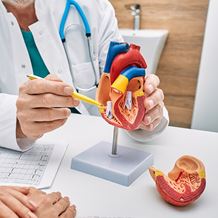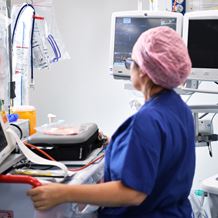
- Home
- Services
- Cardiac Services
- Procedures and Treatments
- Coronary Artery Bypass Graft Surgery
What is Coronary artery bypass graft surgery?
Coronary artery bypass graft surgery, also known as heart bypass surgery or CABG, is a medical procedure to treat coronary heart disease that is caused by diseased arteries. These important blood vessels are responsible for supplying your heart with just the right amount of blood. If a build-up of plaque (atherosclerosis) causes them to become blocked or narrowed, your heart may not receive enough oxygen to function efficiently. Your doctor may recommend coronary artery bypass surgery as an effective way to restore blood flow to the heart. This surgery can improve the function of your heart, reduce the risk of heart failure, improve life expectancy, and help relieve associated chest pain.
What does it do?
Coronary artery bypass graft surgery creates a new and unrestricted pathway for blood to access your heart, avoiding any blocked or narrowed regions. Whilst not a cure for coronary heart disease, this procedure is an effective way to restore the blood supply to your heart, reduce the risk of heart failure and improve any associated symptoms such as angina, a type of chest pain that occurs when the heart is starved of oxygen-rich blood.
How does it work?
Heart bypass surgery works by using a healthy blood vessel from elsewhere in your body to bypass the blocked or narrowed coronary artery. Creating this alternative pathway is known as a bypass route, and helps restore an oxygen-rich blood supply to your heart. Each coronary artery that is damaged can be replaced by a blood vessel from another area of your body, usually from your leg, arm or chest. This is known as a graft.
Why is it performed?
Coronary artery bypass graft surgery can be performed as an emergency treatment for a blocked artery, or as recommended by your doctor to treat coronary heart disease. Common symptoms indicate an increased risk of heart failure and may include:
- Severe chest pain (angina) caused by restricted blood flow to the heart
- Breathlessness
- Swelling
- Palpitations
Some patients still require surgery even if they have no symptoms related to their coronary disease.
Procedure
Heart bypass surgery is a major procedure and can take several hours to complete. You will be given enough anaesthetic to ensure you remain asleep during the surgery and a cut will be made down your breastbone to reach your heart. You will be connected to a special machine that allows your heart to be still during the surgery. The replacement blood vessels are attached to the coronary artery above and below the blockage. Once the bypass is in place, your doctor will restart your heart and get the blood flowing again.
Recovery
Recovery looks different for every patient, but most will need to stay in hospital for one week after coronary heart bypass surgery. At first you will be closely monitored in intensive care before continuing your recovery in the ward. By the end of the week, most patients can walk and use the stairs. On returning home you will be more fatigued than normal and will require extra rest in addition to your rehabilitation exercises. Your doctor will give you a personalised rehabilitation program including instructions for diet, exercise, activities, and medication. Full Coronary artery bypass graft surgery recovery can take up to three months.
What's next?
If you have been experiencing heart-related symptoms, book an appointment with our cardiac services specialist today.
Our specialists in Cardiac Services
View all specialists





